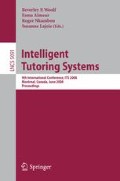Abstract
This paper evaluates dialogue-based student performance in a controlled experiment using versions of a tutoring system with and without automatic adaptation to the student affective state of uncertainty. Our performance metrics include correctness, uncertainty, and learning impasse severities, which are measured in a “test” dialogue after the tutoring treatment. Although these metrics did not significantly differ across conditions when considering all student answers in our test dialogue, we found significant differences in specific types of student answers, and these differences suggest that our uncertainty adaptation does have a positive benefit on student performance.
Access this chapter
Tax calculation will be finalised at checkout
Purchases are for personal use only
Preview
Unable to display preview. Download preview PDF.
References
Workshop on Modeling and Scaffolding Affective Experiences to Impact Learning: Supplementary Proceedings of the 13th International Conference of Artificial Intelligence in Education (AIED), Marina Del Ray, CA, Online proceedings (July 2007), http://www.informatics.sussex.ac.uk/users/gr20/aied07/index.html
Wang, N., Johnson, W., Rizzo, P., Shaw, E., Mayer, R.: Experimental evaluation of polite interaction tactics for pedagogical agents. In: Proceedings of Intelligent User Interface Conference (IUI), pp. 12–19 (2005)
Hall, L., Woods, S., Sobral, D., Paiva, A., Dautenhahn, K., Wolke, D., Newall, L.: Designing empathic agents: Adults vs. kids. In: Proceedings of the Intelligent Tutoring Systems Conference (ITS), Maceio, Brazil, pp. 604–613 (2004)
McQuiggan, S., Mott, B., Lester, J.: Modeling self-efficacy in intelligent tutoring systems: An inductive approach. User Modeling and User-Adapted Interaction (UMUAI) 18(1-2), 81–123 (2008)
Pon-Barry, H., Schultz, K., Bratt, E.O., Clark, B., Peters, S.: Responding to student uncertainty in spoken tutorial dialogue systems. International Journal of Artificial Intelligence in Education 16, 171–194 (2006)
Craig, S., Graesser, A., Sullins, J., Gholson, B.: Affect and learning: an exploratory look into the role of affect in learning with AutoTutor. Journal of Educational Media 29(3), 241–250 (2004)
Bhatt, K., Evens, M., Argamon, S.: Hedged responses and expressions of affect in human/human and human/computer tutorial interactions. In: Proceedings of Cognitive Science (CogSci), Chicago, USA, pp. 114–119 (2004)
VanLehn, K., Siler, S., Murray, C.: Why do only some events cause learning during human tutoring? Cognition and Instruction 21(3), 209–249 (2003)
Kort, B., Reilly, R., Picard, R.: An affective model of interplay between emotions and learning: Reengineering educational pedagogy-building a learning companion. In: Okamoto, T., Hartley, R., Kinshuk, J., Klus, P. (eds.) Proceedings IEEE International Conference on Advanced Learning Technology: Issues, Achievements and Challenges, Madison, WI, pp. 43–48 (2001)
Forbes-Riley, K., Litman, D., Silliman, S., Purandare, A.: Uncertainty corpus: Resource to study user affect in complex spoken dialogue systems. In: Proceedings 6th Language Resources and Evaluation Conference (LREC), Marrakech, Morocco (May 2008)
Forbes-Riley, K., Rotaru, M., Litman, D.: The relative impact of student affect on performance models in a spoken dialogue tutoring system. User Modeling and User-Adapted Interaction 18(1-2), 11–43 (2008)
VanLehn, K., Jordan, P.W., Rosé, C.P., Bhembe, D., Böttner, M., Gaydos, A., Makatchev, M., Pappuswamy, U., Ringenberg, M., Roque, A., Siler, S., Srivastava, R., Wilson, R.: The architecture of Why2-Atlas: A coach for qualitative physics essay writing. In: Proceedings of Intelligent Tutoring Systems (2002)
Cowie, R., Cornelius, R.R.: Describing the emotional states that are expressed in speech. Speech Communication 40(1-2), 5–32 (2003)
Forbes-Riley, K., Litman, D.: Analyzing dependencies between student certainness states and tutor responses in a spoken dialogue corpus. In: Dybkjaer, L., Minker, W. (eds.) Recent Trends in Discourse and Dialogue, pp. 275–304. Springer (2008)
Burleson, W., Picard, R.: Affective agents: Sustaining motivation to learn through failure and a state of stuck. In: Social and Emotional Intelligence in Learning Environments Workshop at the Intelligent Tutoring Systems Conference (ITS), Maceio, Brazil (2004)
Author information
Authors and Affiliations
Editor information
Rights and permissions
Copyright information
© 2008 Springer-Verlag Berlin Heidelberg
About this paper
Cite this paper
Forbes-Riley, K., Litman, D., Rotaru, M. (2008). Responding to Student Uncertainty During Computer Tutoring: An Experimental Evaluation. In: Woolf, B.P., Aïmeur, E., Nkambou, R., Lajoie, S. (eds) Intelligent Tutoring Systems. ITS 2008. Lecture Notes in Computer Science, vol 5091. Springer, Berlin, Heidelberg. https://doi.org/10.1007/978-3-540-69132-7_11
Download citation
DOI: https://doi.org/10.1007/978-3-540-69132-7_11
Publisher Name: Springer, Berlin, Heidelberg
Print ISBN: 978-3-540-69130-3
Online ISBN: 978-3-540-69132-7
eBook Packages: Computer ScienceComputer Science (R0)

